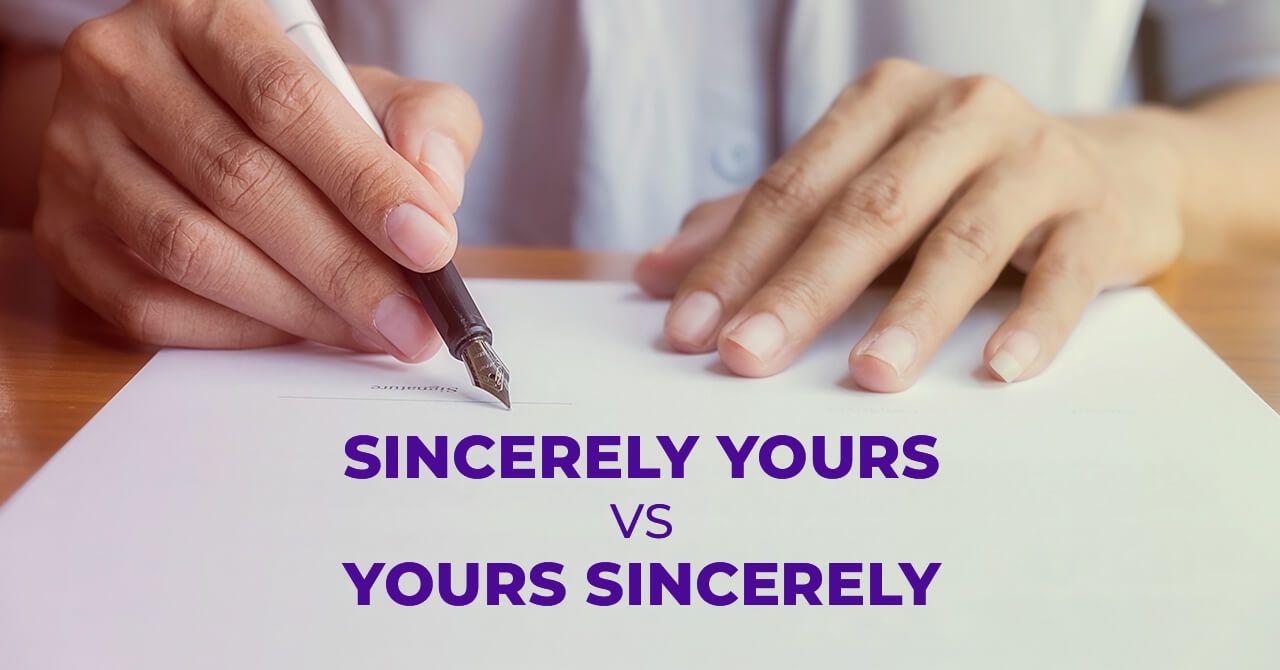
The Meaning and Difference Between “Sincerely Yours” and “Yours Sincerely”
Signing off a letter with “sincerely yours” or “yours sincerely” implies that the contents of the letter are genuine and that you are a trustworthy correspondent.
There are many ways to close an email or letter, depending on who you are writing to, the subject matter, and the formality. One popular option is “sincerely yours.”
“Sincerely Yours”—Meaning
The word “sincere” is derived from “sincerus.” This is a Latin word meaning clean and pure. Over time, the meaning has evolved to refer to honesty. Hence sincere meaning genuine, honest and free of falseness. Its first known use as a letter closing was around the year 1700. Signing off a letter with “sincerely yours” or “yours sincerely” implies that the contents of the letter are genuine and that you are a trustworthy correspondent.
“Yours Sincerely” vs. “Sincerely Yours”
You may also be familiar with the phrase in reverse order: “yours sincerely.” Both of these closings are correct; however, one is common in American English while the other is exclusive to British English. What’s more, the rules for using each one are different.
“Your Sincerely” or “Yours Sincerely”
As mentioned above, in British English, there are a few specific rules to follow when using “Yours sincerely.” Firstly, it should always be written with an “S” at the end of “yours.” Secondly, the main rule is that it must only be used when addressing somebody you know. This could be an acquaintance, colleague, or superior, as it is highly formal. It is always paired with the letter opener “Dear” + the addressee's name. In formal letters where you know who you are writing to, this would be “Dear Mr/Mrs” plus their surname, or a full name, for example, “Dear Karen Smith.” Using the first name alone would be informal and, therefore could be rude in professional correspondence.
If you do not know the name of the person you are writing to, you will instead start your formal letter or email with “Dear Sir/Madam.” In this case, the correct closing would be “Yours faithfully.”
Here’s a quick way to memorize when to use sincerely vs. faithfully: you must be faithful to people you don’t know and sincere to those you do.
What Does “Sincerely Yours” Mean?
You may wonder whether or not people pay attention to the formula you use to end your letter. When you choose an appropriate word or phrase, it will likely go unnoticed. This is a good thing because what matters is the content of your email or letter, not the way you sign it off. However, if you choose an inappropriate closing line, it is likely to stand out. Using an overly-formal sign-off when writing to a close friend or colleague will seem odd but inoffensive. Using an informal letter ending when writing to a stranger or superior, on the other hand, could land you in serious trouble. At best, it may distract from the message you were trying to get across; at worst, the recipient might think you’re downright rude.
“Sincerely Yours” in a Letter
“Sincerely yours” is used to closing formal letters. It is a shortened version of “I am sincerely yours.” In American English, we can also simply say “sincerely” as an abbreviated form.
“Sincerely” is now used alone more often than “sincerely yours.” It is most appropriate in business communication, such as emails. In order to elevate the formality of your complimentary closing, you should opt for the whole phrase.
Formatting “Sincerely Yours”
You should write a letter closing in line with the date. The closing should be below the last paragraph of your letter, with an empty line in between. Always capitalize the first letter of the closing sentence, in this case, “Sincerely yours,” and follow it with a comma. Underneath, there should be room to write your name and/or signature.
If you don’t want to use “sincerely yours” as the closing phrase in your letter or email, there are various alternatives that you can use. Always ensure that the closing compliment matches the letter opening in terms of formality. Here are some alternatives that you can use.
Formal alternatives:
- Regards;
- Yours truly;
- Best regards;
- Cordially;
- Yours respectfully;
- Yours faithfully.
Informal alternatives:
- Best wishes;
- Take care;
- All the best.
Extremely informal closing compliments which should be reserved for friends and family only:
- See you soon;
- Lots of love;
- Hugs and kisses.
Hello! My name is Beth. I'm from France. I'm a French and English native speaker and I really like writing.

